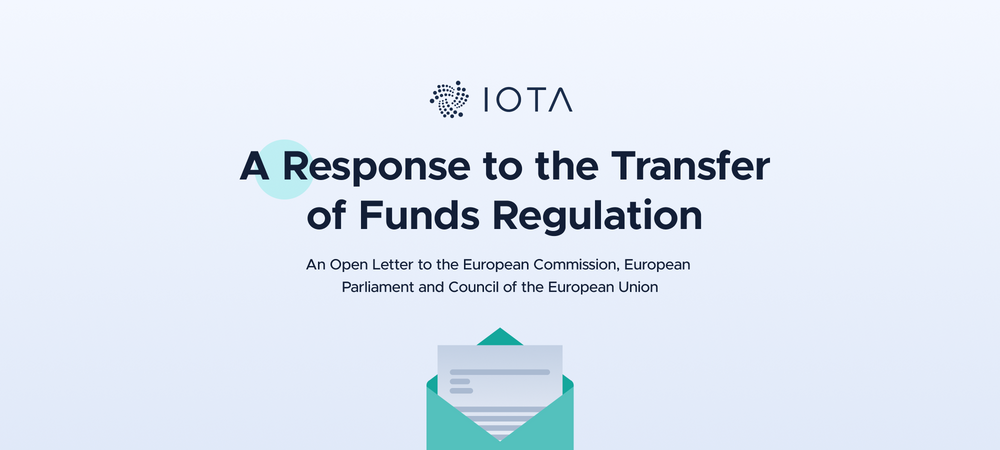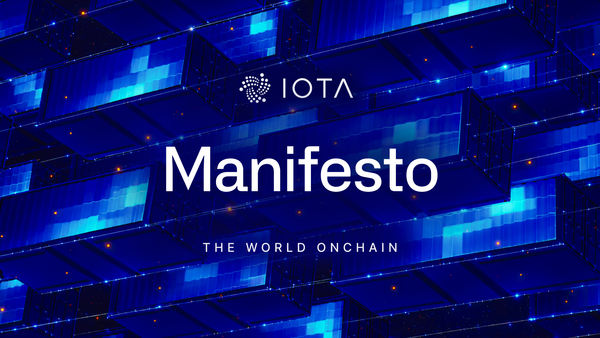A Response to the Transfer of Funds Regulation
An Open Letter to the European Commission, European Parliament, and Council of the European Union
On 28 April 2022, Trilogue meetings on the Transfer of Funds Regulation (TOFR) between the European Commission, the European Parliament, and the Council of the European Union began and the second Trilogue begins on 29 June 2022. While the IOTA Foundation is fully aligned with the TOFR's goal of combating money laundering, we are concerned about certain rules in the regulation that would amount to a de facto ban on unhosted wallets and would cause severe damage to the machine economy and the European crypto industry. Therefore, we ask you to support our cause by sharing this letter and filling out the response sheet linked to this blog post.
Dear regulatory decision-makers,
The IOTA Foundation fully supports the objectives of the European Union and the Financial Action Taskforce (FATF) in combating money laundering and preventing the financing of terrorism and other criminal offenses. We agree with these objectives that are at the center of the proposed Transfer of Funds Regulation (TOFR).
That said, we believe the proposed TOFR legislation can critically affect the machine economy that we represent if it stymies the use and development of services involving unhosted wallets. In this open letter, we examine the parts of the proposed legislation affecting unhosted wallets and their ability to interact with Crypto Asset Providers (CASPs), as these components are essential to the machine economy. We also call on regulators to explore alternatives to reach our shared objectives of transparency and security.
In this open letter, we explain why the current draft of the Transfer of Funds Regulation amounts to a factual ban on unhosted wallets and we will point out the importance of unhosted wallets for the machine economy (I). Next, (II) we will depict the impact that certain provisions of the current compromised version of the EP would have on the whole European crypto industry. Lastly, (III) we will show why the regulatory approach of the FATF guidelines is the only viable path, focusing instead on verification of the various players of a transaction in a legally enforceable, risk-based approach for checking individual transactions.
I) Unhosted wallets are essential for the machine economy
Over the past couple of decades, the number of connected devices has drastically increased and is estimated to reach 75 billion by 2025. From sensors on roads, in cars, or in industrial equipment; to digital identity solutions, health care applications, green energy, and more – the world is becoming more and more connected, opening the door for the tokenized machine economy.
In this machine economy, connected intelligent machines are autonomous market participants. They can autonomously exchange services, funds, goods, and data. In the future, each machine will be equipped with its own unhosted wallet, which enables it to interact independently with sensors and networks to achieve an efficient and scalable machine economy. The benefits of machines, automatically trading tokens and data directly with each other or via CASPs are monumental.
For example, a car equipped with its own hosted wallet could automatically transact tokens with a parking meter equipped with its own unhosted wallet. This way, the car could pay for parking or trade tokens on an exchange to pay for services in a new network or territory. Unhosted wallets allow these microtransactions to occur quickly, without additional costs and unimpacted by the volume of transactions taking place.
II) Maximalist regulation of unhosted wallets: The detrimental impact of the proposed changes on the machine economy and the European crypto industry
We are alarmed that the FATF guidelines could be transposed excessively in the European Union. The European Parliament’s position requires CASPs to verify both the originator and beneficiary of each transaction with unhosted wallets, even though an unhosted wallet cannot constitute a legally obliged entity. Operationally, this is impossible, especially for machines.
Furthermore, we are concerned that the proposed reporting requirements for transactions with unhosted wallets over EUR 1,000 will become an unmanageable administrative burden for national competent authorities while being of limited operational utility.
Ultimately, the European Parliament’s current position will make payments between machines and CASPs unnecessarily slow and expensive, undermining the development of new use cases in the machine economy in the EU. Other jurisdictions stand to win from the European Union’s loss.
Another example is automated energy trading in the context of renewable energy, whereby consumers become producers of energy. In the future, smart meters and other devices could automatically buy and sell energy on behalf of their owners. Such smart machines would rely on unhosted wallets being able to conduct high volume transactions on a large scale as prices fluctuate according to supply and demand. Billions of machines and smart sensors could interact with each other either directly or through automated marketplaces. Any delay caused by an intermediary having to verify the identity of market participants for each micro-transaction would preclude the use of this new technology. To support European climate goals (under the 2030 Climate Target Plan) and the development of new technical solutions in the machine economy, the EU needs regulation that appropriately considers the broad use of unhosted wallets.
III) Solution: A risk-based approach in line with FATF guidelines
The IOTA Foundation is fully committed to the fight against money laundering. We recognize the Commission, the Council, and the European Parliament’s efforts in acknowledging the particular technological nature of transfers in crypto assets, and in differentiating the risk profile of these transfers from electronic money. To this end, we believe that transactions between unhosted and hosted wallets should be brought into the scope of AML/CFT rules while recognizing that unhosted wallets are not obliged entities. Such regulatory treatment is consistent with FATF guidelines and their risk-based approach.
Therefore, we suggest the following:
- CASPs as regulated entities should be the pivot point of the fight against money laundering. Sanctions for screening and monitoring suspicious transactions are already within their scope. They have the possibility and means to ensure the scrutiny of crypto transactions in relation to their own customers. We believe the Commission’s proposal, as well as the Council of the EU’s negotiation mandate for TOFR, accurately reflect this reality.
- The initial proposal of the Transfer of Funds Regulation published by the European Commission suggested a de minimis exemption for transfers under EUR 1000. This exemption is also in line with the FATF guidelines and is the best and most viable approach to micropayments by machines.
- In the European Union’s fight against money laundering, two specific dimensions of distributed ledgers must be further assessed and leveraged, namely (i) their ability to create an immutable and publicly visible record of every transaction and (ii) their ability to support the development of decentralized financial applications. Therefore, we support the inclusion of a review clause (new Article 30a), and we believe this clause should include the following additional point: “assessing the uses of decentralized ledger technology in the fight against ML/TF”. As technological tools outpace the current methods of dealing with ML/TF, so must the tools to fight it evolve.
We hereby encourage other DLT stakeholders, whether they are crypto projects, universities, research individuals, service providers, or the like, to join us and sign this open letter here. We strongly believe that a fair law is the only basis for moving forward together.




